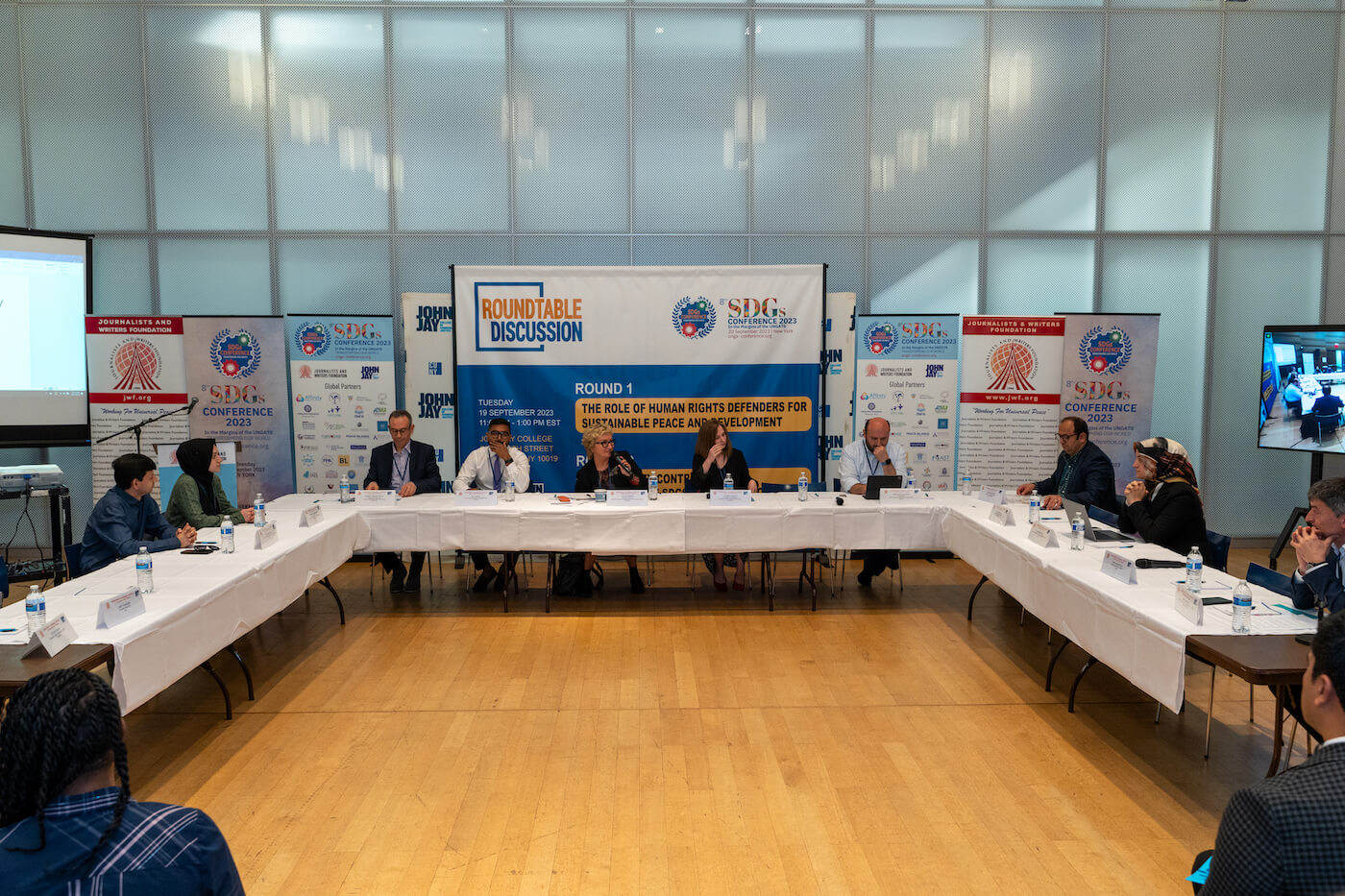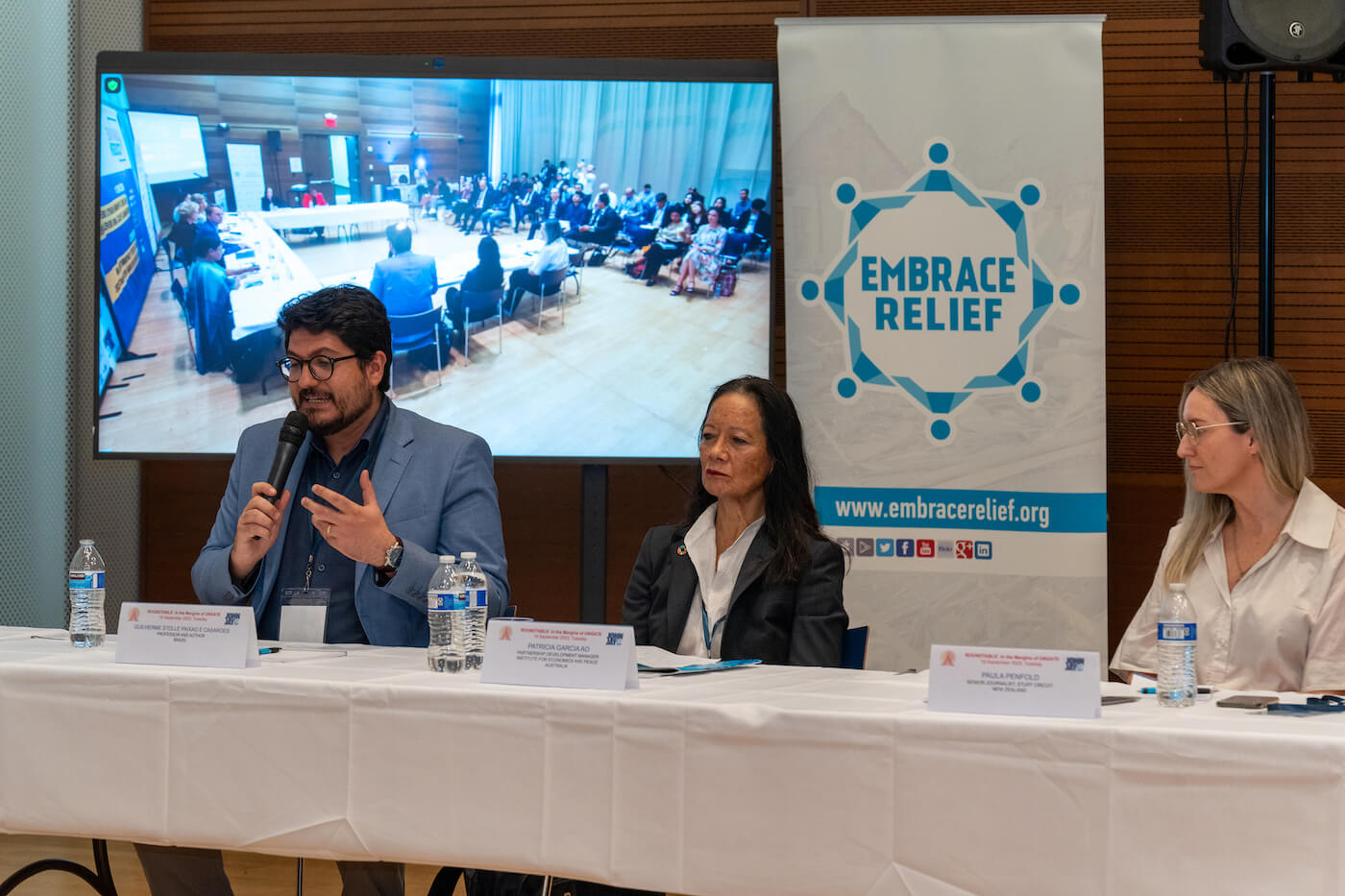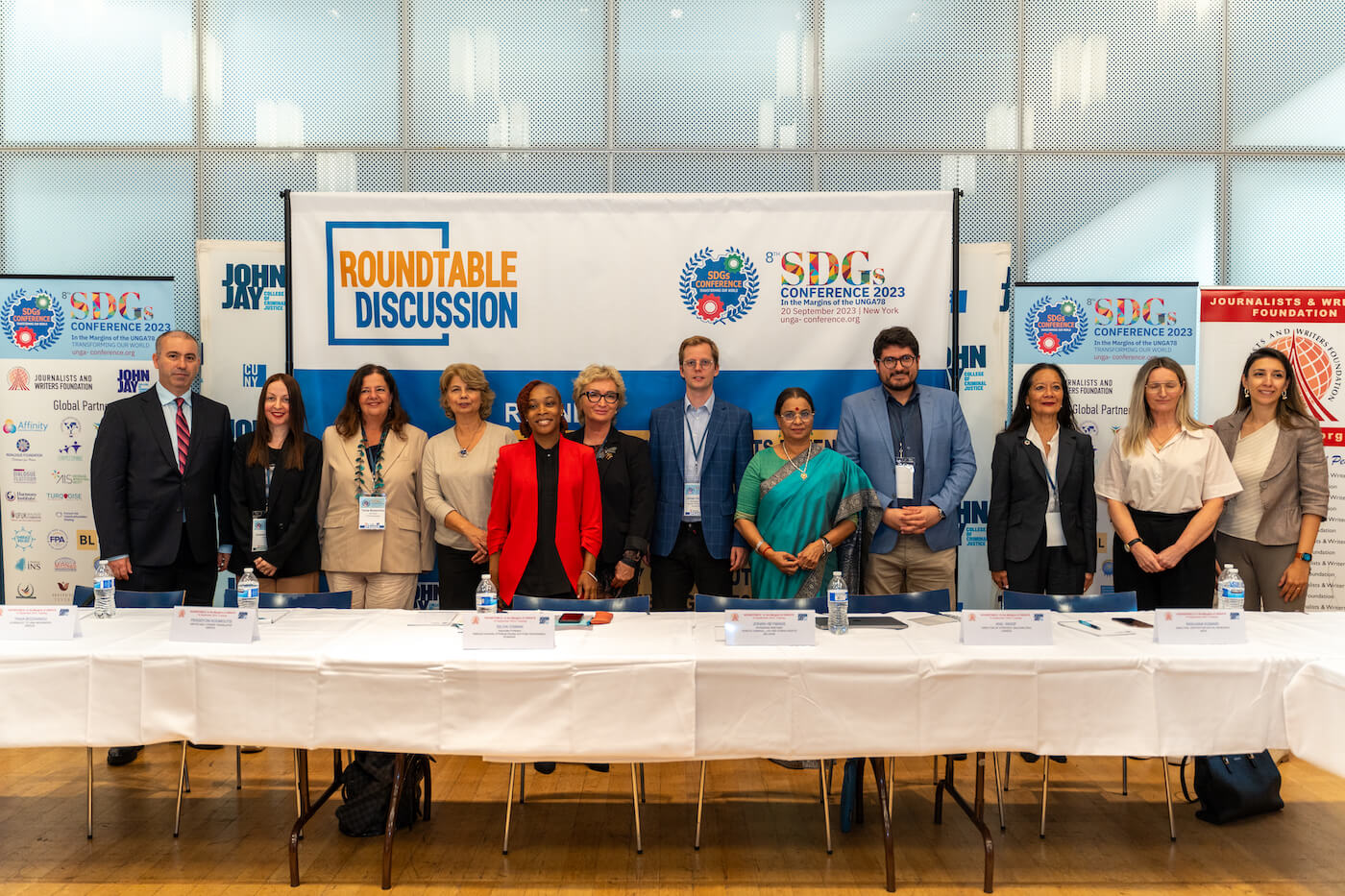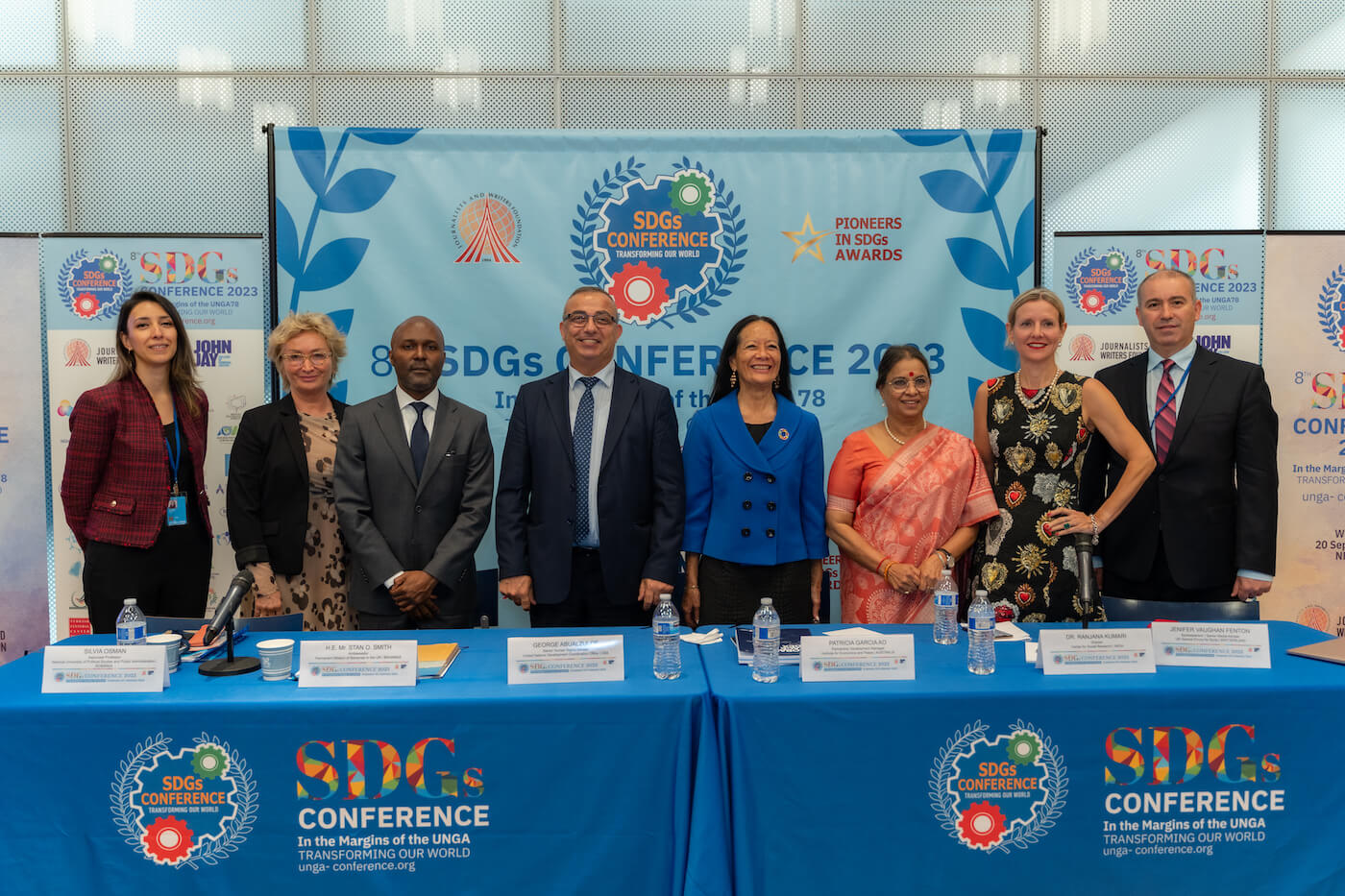In 2015, the United Nations adopted its 17 Sustainable Development Goals as a blueprint for humanity’s long-term, sustainable peace, happiness, and prosperity by 2030. Our current year, 2023, marks the midway point of this timeline and provides us all with a chance to step back and evaluate our progress toward achieving these goals. Unfortunately, an honest examination of this progress reveals that the world still has a long way to go.
Taking stock of the past seven years of global development and exploring ways to build momentum for the next seven were the key themes of the SDGs Conference 2023, a two-day event featuring discussions with notable diplomats, academics, journalists, and civil society leaders. The Journalists and Writers Foundation organized the conference, held Sept. 19-20 at John Jay College of Criminal Justice in New York, in the margins of the 78th UN General Assembly. Embrace Relief is a proud global partner of the Journalists and Writers Foundation and was a presenting partner for this event.
The conference featured a two-part roundtable discussion on Sept. 19, followed by three-panel discussions on Sept. 20, each one focused on a different aspect of the challenges that must be overcome in order to keep the promise of the SDGs.


The State of the SDGs
Journalists and Writers Foundation President Mehmet Kilic opened the Sept. 20 conference by providing an overview of the world’s current situation. He noted that, despite being seven years into the UN’s 2030 Agenda for Sustainable Development, only 15 percent of the agenda’s measurable targets are on track to be achieved in seven years’ time.
“Today, we find ourselves at a critical juncture in the road and facing a multitude of interconnected challenges, from extreme poverty and climate change to the rapid advancements of artificial intelligence and the urgency to foster peace among great power nations,” said Kilic in his opening remarks. “It is essential for us to remain engaged and committed to the values and goals that unite us as a global community. We can overcome even the most daunting challenges and obstacles when the world comes together. But no one can achieve anything alone.”
As each speaker laid out, the challenges to achieving the SDGs are great, including climate change, conflict, rampant and increasing inequality, and the rise of autocracy around the world. The COVID-19 pandemic was also noted as a setback that has increased the number of people living in extreme poverty for the first time in generations.
This year’s SDG Conference underscored the urgency of accelerating efforts to achieve the goals by 2030. Participants stressed the need for increased political will, innovative solutions, and global cooperation to address pressing challenges. All nations, large or small, must play a role, said Ambassador Stan O. Smith, Bahamas’ representative to the UN. He added that it is the responsibility of world leaders to respect the commitments made in 2015 and to redouble efforts to overcome these challenges.
“It is not to be bilaterally, or by the ingenuity of one state,” Ambassador Smith said, “but instead by a framework of multilateralism, where many states can cooperate and share resources to find the innovation and solutions we need.”

Universal, shared challenges to development
Based on current trends, noted George Abualzulof, senior human rights advisor for the UN Development Coordination Office, by 2030, more than 575 million people will be trapped in extreme poverty, and 84 million children will be out of school. Global climate trends indicate that Earth’s global temperature will reach the “tipping point” of 1.5 degrees above pre-industrial levels by 2035, leading to catastrophic sea-level rise and exacerbating the already-frequent heat waves, droughts, flooding, and wildfires. These are just a few of the SDG targets that are far from being met currently.
The Goals serve as “the clearest blueprint for humanity’s highest aspirations,” Abualzulof said, because they call for the addressing of basic human needs to live free of poverty (SDG 1) and free of hunger (SDG 2), with access to clean water (SDG 6), health care (SDG 3), education (SDG 4) and a habitable planet (SDG 13) guaranteed for all. A world in which the goals are met is a resilient, prosperous, and harmonic world – but, multiple panelists noted, it is a world that is far from our current reality.

“What we are experiencing now is a collective failure,” Abualzulof said. “Inequality has worsened, strikingly also for women and girls. More people are being denied health care and education. The climate crisis is causing destruction of lives and livelihoods. This collective failure will impact every country, but the burden falls most heavily on developing countries and the world’s poorest and most vulnerable people.”
Other panelists delved deeper into the wide range of challenges. Patricia Garcia of Australia’s Institute for Economics and Peace described the role conflict plays in holding back development worldwide. In 2022 alone, IEP research revealed that the economic cost of international conflict and military expenditure was a staggering $17.5 trillion, approximately $2,200 for every person on the planet.
“Imagine what good we could do with this money instead of spending it on violence,” Garcia said.
The conditions necessary for international peace (SDG 16), Garcia acknowledged, are closely linked to one another and include a well-functioning government, equitable distribution of resources, a free flow of information, good relations with neighbors, a low level of corruption, and a sound business environment. Where these conditions exist, she added, we see societies with the “attitudes, institutions and structures” necessary to advance the goals as well.
Dr. Ranjana Kumari, director of the Center for Social Research in India, championed the importance of giving women a seat at the table as decision-makers and leaders (SDG 5), and urged data collection as a tool for understanding where action is most urgently needed to produce gender equality.
“When you have the data, you can have informed policy and advocacy,” Dr. Kumari said. “It’s extremely important for all of us who are working in different kinds of fields. There is a power in data, where if people understand what is happening, it empowers policymakers to design correct interventions.”
An emphasis on human rights
In addition to being the halfway point towards the Agenda for Sustainable Development, 2023 also marks the 75th anniversary of the Universal Declaration of Human Rights, the landmark document that enshrines the fundamental rights and basic freedoms that all people share. During the Sept. 19 roundtable discussion, moderator Silvia Osman urged decision-makers to orient their actions and ideas around a human rights framework. This, she said, would be key to navigating a world where inequality continues to grow, literacy and education rates are in decline, and polarization and atomization are on the rise.
Other panelists discussed the growing specter of autocracy and its effects on achieving the SDGs. The rise of autocratic governments in recent years threatens to undo much of the progress and cooperation achieved thus far, even insufficient as it’s been. Repressive governments cracking down on free expression and press freedom have been a critical obstacle for defenders of human rights. Panelists stressed that these values of freedom are paramount to achieving the SDGs because they foster an open, healthy culture that can critically evaluate the impact of policies on all people in society.
“It is through our collective commitment to democratic values and our ability to adapt to the rise of autocracies that the world’s future depends,” said Naseer A. Faiq, charge d’affaires of the Permanent Mission of Afghanistan to the UN. Mr. Faiq pointed to human rights violations by his country’s ruling government, particularly against women’s rights, as an example of how repressive governments can set back the movement for sustainable development.
“The rise of autocracies poses a formidable challenge to a global order based on democratic values,” he added. “The international community must stand united and maintain its commitment to defending democracy, human rights, and the rule of law, not just when it is convenient, but especially when these principles are under threat.”

How Embrace Relief fits into our sustainable future
As an international humanitarian aid organization, Embrace Relief is firmly committed to the values of human rights and sustainable development, and our efforts are dedicated to helping the achievement of the UN Sustainable Development Goals. This is why we are a global partner with the Journalists and Writers Foundation and a presenting partner of the SDGs Conference 2023.
We are working on the ground in more than 50 countries to turn these values and ideas into action. Each of our eight humanitarian relief programs directly addresses at least one of the 17 goals, and several help progress multiple SDGs.
To illustrate this, take one of Embrace Relief’s programs, our Clean Water Initiative to build water wells in the African countries of Chad, Cameroon, Nigeria, Tanzania, Kenya and Uganda:
- Providing access to a reliable, safe source of drinking water moves us closer to achieving Goal 6: Clean Water.
- A reliable, safe supply of drinking water can virtually eliminate the waterborne diseases that kill and harm millions of people in this region each year, producing better public health outcomes in alignment with Goal 3: Health and Well-being.
- When water is in greater abundance, rural communities in the countries we serve have more ability to produce greater amounts and varieties of food, helping to realize Goal 2: Zero Hunger.
- Additionally, a more convenient water source significantly reduces the burden borne by women and girls, who are most often responsible for daily, miles-long journeys to fetch water for their families. A water well can free up time to allow women and girls to pursue education and working careers or to take care of their families, which helps promote Goal 5: Gender Equality.
The Global Goals are humanity’s best roadmap for a future where everyone in every country can live fulfilling, healthy, happy, and prosperous lives free from the burdens of poverty, hunger, thirst, violence, illiteracy, and other challenges. Embrace Relief stands proudly with the UN, the Journalists and Writers Foundation, and the international community in working to make the Sustainable Development Goals a reality. We will continue to develop our programs in accordance with the SDGs, and we will continue to work to reduce suffering around the world while providing opportunities for people to thrive in a sustainable way.
To learn more about how all of Embrace Relief’s programs address the SDGs, click here.
To support Embrace Relief’s mission by donating to support our programs, click here.






















